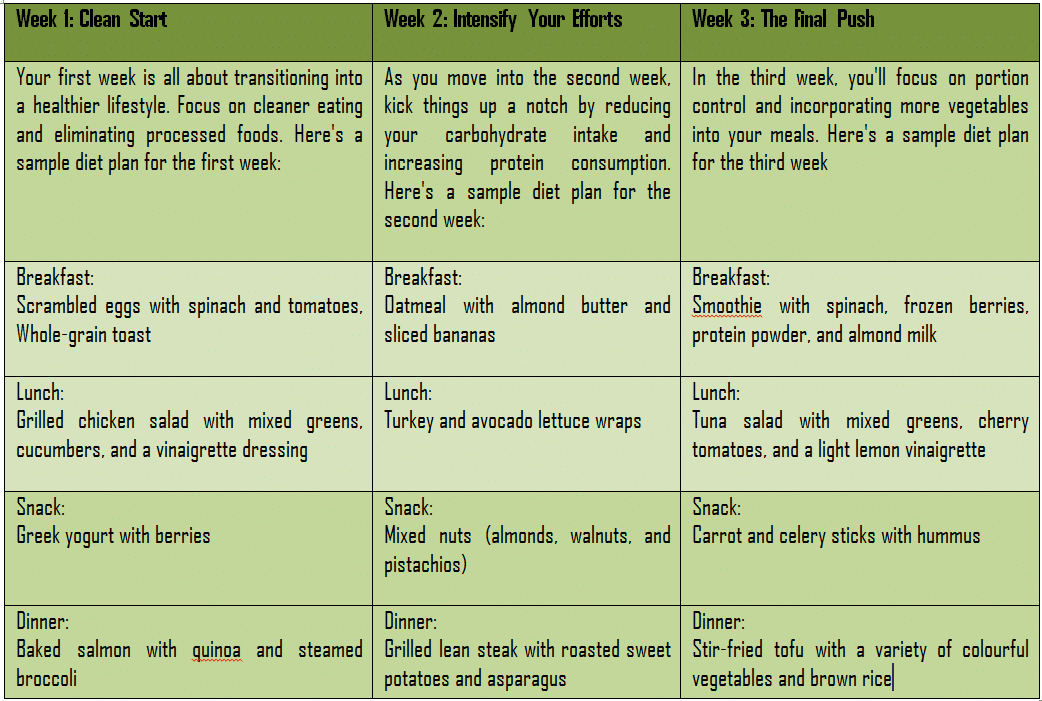How to lose 25lbs in 3 weeks: Your Magical Transformation
When it comes to embarking on a weight loss journey, the road ahead can seem daunting. However, with the right strategy, determination, and a well-balanced diet, you can achieve remarkable results in just three weeks. Are you ready to discover How to lose 25lbs in 3 weeks? Buckle up as we guide you through an effective and sustainable approach to achieving your weight loss goals.
Lets Explore the journey How to lose 25lbs in 3 weeks
The Foundation: Setting Realistic Goals
Before diving into the nitty-gritty of diet and exercise, it’s essential to set realistic goals. While losing 25 pounds in three weeks is an ambitious target, it’s important to remember that healthy weight loss typically ranges from 1 to 2 pounds per week. Rapid weight loss can lead to muscle loss and potential health risks. However, a structured plan can help you make a significant dent in your weight loss journey. You can also read a complete guideline on Rapid Weight Loss for women
The Power of a Balanced Diet
In the quest to lose 25lbs in 3 weeks, the true hero of your journey is a balanced and nourishing diet. Your body is a complex machine, and the fuel you provide has a direct impact on how efficiently it operates. A well-structured, balanced diet not only aids in weight loss but also promotes overall well-being, increased energy, and enhanced mental clarity. Let’s delve deeper into the power of a balanced diet and how it can propel you towards your goals.
Nutrient Density: Quality Over Quantity
A balanced diet emphasizes nutrient-dense foods that pack a punch in terms of vitamins, minerals, fiber, and other essential compounds. These foods provide the sustenance your body needs while keeping calories in check. Opt for whole foods like fruits, vegetables, lean proteins, whole grains, and healthy fats. These options offer a wealth of nutrients, helping you feel fuller for longer and curbing unhealthy cravings.
Steady Blood Sugar Levels
Balanced meals and snacks contribute to stable blood sugar levels. This is crucial for sustained energy throughout the day and for preventing energy crashes that often lead to overeating. Incorporating complex carbohydrates, such as whole grains, and pairing them with lean proteins and healthy fats can help regulate blood sugar levels, reducing the likelihood of spikes and crashes.
Supporting Metabolism
Your metabolism is responsible for converting the food you eat into energy. A balanced diet provides the right mix of nutrients to support a healthy metabolism. Protein, for instance, requires more energy to digest than carbohydrates or fats, which means your body burns more calories during digestion. Additionally, the vitamins and minerals present in whole foods play essential roles in various metabolic processes.
Building and Repairing Tissues
Proteins are the building blocks of your body. They play a vital role in repairing tissues, supporting muscle growth, and maintaining a strong immune system. Incorporating lean protein sources like poultry, fish, beans, and tofu into your diet ensures that your body has the necessary tools to repair and rebuild itself after workouts and daily wear and tear.
Optimal Digestive Health
Fiber, found abundantly in fruits, vegetables, and whole grains, is your digestive system’s best friend. It aids in digestion, helps prevent constipation, and supports a healthy gut microbiome. A well-balanced diet with plenty of fiber can promote regular bowel movements and improve overall digestive health.
Mental Clarity and Mood Regulation
The foods you eat have a significant impact on your brain health. Omega-3 fatty acids, found in fatty fish like salmon, as well as in walnuts and flaxseeds, are known to support cognitive function and may even help regulate mood. Balanced meals that include a variety of nutrient-rich foods can contribute to improved mental clarity and a more positive outlook.
Long-Term Sustainability
Crash diets and extreme restrictions are often unsustainable and can lead to a cycle of yo-yo dieting. In contrast, a balanced diet is not just a short-term fix; it’s a long-term approach to healthy living. By cultivating a positive relationship with food and enjoying a wide array of nutrient-dense options, you’re more likely to stick to your healthier habits beyond the three-week mark.
When you are on your lose 25lbs in 3 weeks journey, it is crucial to consider long-term sustainability as well as your health. Adopting crash diet or rapid weight loss medicine may harm your health in long run. Consult a nutritionist before starting your lose 25lbs in 3 weeks goal. 
Empowering Your Transformation
As you embark on your journey to lose 25lbs in 3 weeks, remember that your body is a remarkable system that thrives on balance and nourishment. Each meal you consume is an opportunity to provide your body with the tools it needs to function optimally. By choosing a variety of whole foods, portioning your meals mindfully, and staying hydrated, you’re equipping yourself with the power to transform not only your physical appearance but also your overall quality of life.
Below is a plan of 3 weeks diet chart. You can follow the diet chart strictly to get expected outcome without no delay. However, you may find the diet plan dull and boring; you can incorporate variation considering your meal choice. Feel free to swap out ingredients, try new recipes, and explore different types of cuisines. The more diverse your diet, the wider the range of nutrients you’ll be consuming.
Diving Deeper into Your Diet Plan
Portion Control
While following the three-week diet plan mentioned earlier, it’s important to pay attention to portion sizes. Portion control plays a significant role in managing calorie intake. Consider using smaller plates and bowls to help control portion sizes and prevent overeating.
Hydration and Snacking
Staying hydrated not only helps control your appetite but also supports your metabolism. Along with water, you can infuse your drinks with slices of fruits or herbs for a refreshing twist. When it comes to snacking, choose options that are rich in nutrients and low in empty calories. Snacking on a handful of almonds, a piece of fruit, or a small serving of Greek yogurt can help curb cravings between meals.
Meal Prepping for Success
Meal prepping can be a game-changer in your weight loss journey. Spend some time each week planning and preparing your meals in advance. This not only saves you time but also ensures that you have healthy options readily available, making it easier to stick to your diet plan.
Elevating Your Exercise Routine
HIIT Workouts
High-Intensity Interval Training (HIIT) is a fantastic way to burn calories and boost your metabolism. These workouts involve short bursts of intense exercise followed by periods of rest. A typical HIIT session might include exercises like burpees, jumping jacks, and mountain climbers. Aim for 20-30 minutes of HIIT workouts 3 times a week for optimal results.
Incorporating Cardio Variability
While cardiovascular exercise is important, incorporating variety can prevent boredom and challenge your body in different ways. Alternate between activities like running, cycling, and swimming to engage various muscle groups and keep your workouts exciting.
Strength Training Progression
As you progress through the three weeks, you can gradually increase the intensity of your strength training workouts. This might involve using heavier weights, increasing repetitions, or trying more advanced exercises. Strength training not only helps you build muscle but also contributes to a higher resting metabolic rate, aiding in weight loss.
Staying Motivated and Overcoming Challenges
Visualize Your Goals
Create a visual representation of your weight loss goals. This could be a vision board, a digital image, or even a written statement. Placing this somewhere you’ll see it daily serves as a reminder of what you’re working towards.
Mindful Eating Practices
Practicing mindful eating involves being fully present during meals. Slow down, savor each bite, and listen to your body’s hunger and fullness cues. This can prevent overeating and help you enjoy your meals more fully.
Celebrate Non-Scale Victories
Weight loss isn’t solely about the number on the scale. Celebrate other achievements like improved energy levels, better sleep quality, increased stamina, and improved mood. These non-scale victories can be powerful motivators.
Overcoming Plateaus
It’s not uncommon to hit a plateau during your weight loss journey. When progress seems to stall, don’t get discouraged. Reevaluate your diet, exercise routine, and stress levels. Sometimes, making minor adjustments can jumpstart your progress again.
Social Support and Accountability
Share your journey with friends, family, or a supportive online community. Having people to share your successes and challenges with can provide valuable encouragement and accountability.
Listening to Your Body
Throughout your three-week transformation, it’s crucial to listen to your body. If you experience any discomfort, fatigue, or unusual symptoms, consult a healthcare professional. Your health and well-being should always be your top priority.
Staying Hydrated and Mindful
In addition to following a balanced diet, staying hydrated is crucial. Aim to drink at least 8 glasses of water each day. Proper hydration aids digestion, boosts metabolism, and helps control appetite. Additionally, practicing mindful eating can prevent overeating and promote a healthier relationship with food. Eat slowly, savor each bite, and pay attention to your body’s hunger and fullness cues.
The Exercise Component
While diet plays a significant role in weight loss, incorporating regular exercise can amplify your results and improve your overall well-being. Aim for a mix of cardiovascular exercise, strength training, and flexibility exercises.
Cardiovascular Exercise: Engage in 30-45 minutes of moderate-intensity cardio exercises like brisk walking, jogging, cycling, or swimming at least 5 days a week.
Strength Training: Include 2-3 days of strength training using bodyweight exercises, resistance bands, or free weights. Focus on full-body workouts targeting major muscle groups.
Flexibility Exercises: Dedicate time to stretching or yoga to improve flexibility and reduce the risk of injury.
The Importance of Rest and Recovery
Remember, rest is an essential component of any successful weight loss journey. Aim for 7-9 hours of quality sleep each night to allow your body to recover and rejuvenate. Insufficient sleep can lead to increased cravings, decreased energy levels, and hindered progress.
Tracking Your Progress
Keep a journal to track your daily meals, exercise routine, and emotions. This will help you identify patterns and make necessary adjustments to your plan. Celebrate your successes, no matter how small, and use any setbacks as learning opportunities.
Lose 25lbs in 3 weeks is an ambitious goal. It requires dedication, consistency, and a holistic approach with a balanced diet, regular exercise, and proper rest, it’s achievable. Remember, the key is to focus on progress rather than perfection, and to adopt a sustainable approach that sets you up for long-term success.
Consult a healthcare professional before making significant changes to your diet or exercise routine, and always prioritize your health and well-being above all else. Get ready to embark on a transformative journey. As you embark on this transformative journey, you’re not just shedding pounds; you’re gaining a healthier, more confident version of yourself.
I hope this article helps you in your weight loss journey. Keep in touch we will get back to you with more weight loss tips, diets, low calories recipes. Let us know what you need in our comment section. We will respond at soonest of your queries.



